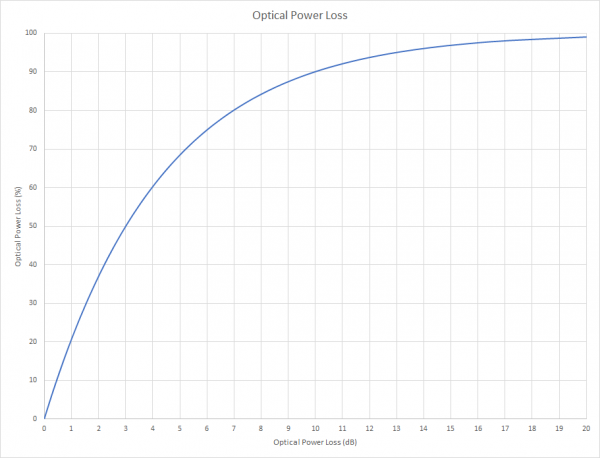Attenuation signal reduction to dB: Difference between revisions
Jump to navigation
Jump to search
(Created page with " Introduction Many fiber optic technicians are unfamiliar working with logarithmic units like decibel (dB). This table allows you to get a grasp on the relationship between...") |
mNo edit summary |
||
| (15 intermediate revisions by the same user not shown) | |||
| Line 1: | Line 1: | ||
Introduction | == Introduction == | ||
Many fiber optic technicians are unfamiliar | Many fiber optic technicians are unfamiliar with logarithmic scales and units such as decibel (dB). | ||
This table allows you to get a grasp on the relationship between loss on a | This table allows you to get a grasp on the relationship between optical power loss on a logarithmic scale (dB) and optical power loss on a linear scale (%). | ||
Power Loss (dB) is also known as Attenuation (dB). | |||
| | ||
Solution | == Solution == | ||
=== Table === | |||
| |||
{| style="width: 500px" cellspacing="1" cellpadding="1" border="1" align="left" | {| style="width: 500px" cellspacing="1" cellpadding="1" border="1" align="left" | ||
|- | |- | ||
! scope="col" | | ! scope="col" | | ||
! scope="col" | | Optical Power Loss (dB) | ||
Attenuation (dB) | |||
! scope="col" | | |||
Optical Power Loss (%) | |||
| |||
|- | |- | ||
| | | style="text-align: center" | 0 dB | ||
| | | style="text-align: center" | 0% | ||
|- | |- | ||
| | | style="text-align: center" | 1 dB | ||
| | | style="text-align: center" | 21% | ||
|- | |- | ||
| | | style="text-align: center" | 2 dB | ||
| | | style="text-align: center" | 37% | ||
|- | |- | ||
| | | style="text-align: center" | 3 dB | ||
| | | style="text-align: center" | 50% | ||
|- | |- | ||
| | | style="text-align: center" | 4 dB | ||
| | | style="text-align: center" | 60% | ||
|- | |- | ||
| | | style="text-align: center" | 5 dB | ||
| | | style="text-align: center" | 68% | ||
|- | |- | ||
| | | style="text-align: center" | 6 dB | ||
| | | style="text-align: center" | 75% | ||
|- | |- | ||
| | | style="text-align: center" | 7 dB | ||
| | | style="text-align: center" | 80% | ||
|- | |- | ||
| | | style="text-align: center" | 10 dB | ||
| | | style="text-align: center" | 90% | ||
|- | |- | ||
| | | style="text-align: center" | 13 dB | ||
| | | style="text-align: center" | 95% | ||
|- | |- | ||
| | | style="text-align: center" | 15 dB | ||
| | | style="text-align: center" | 96.8% | ||
|} | |} | ||
| | ||
| |||
| |||
| |||
| |||
| |||
| |||
| |||
| |||
| |||
| |||
| |||
| |||
=== Graph === | |||
| |||
[[File:OpticalPowerLoss.png|border|left|600px|OpticalPowerLoss.png]] | |||
Latest revision as of 14:59, 4 May 2024
Introduction
Many fiber optic technicians are unfamiliar with logarithmic scales and units such as decibel (dB).
This table allows you to get a grasp on the relationship between optical power loss on a logarithmic scale (dB) and optical power loss on a linear scale (%).
Power Loss (dB) is also known as Attenuation (dB).
Solution
Table
|
Optical Power Loss (dB) Attenuation (dB) |
Optical Power Loss (%)
|
|---|---|
| 0 dB | 0% |
| 1 dB | 21% |
| 2 dB | 37% |
| 3 dB | 50% |
| 4 dB | 60% |
| 5 dB | 68% |
| 6 dB | 75% |
| 7 dB | 80% |
| 10 dB | 90% |
| 13 dB | 95% |
| 15 dB | 96.8% |
Graph
